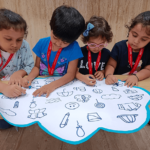Parenting comes with all kinds of joys, but let’s be honest—it also brings its challenges, especially when you’re trying to juggle daily tasks, work, and family life. Some days, it can feel like there simply aren’t enough hours to get it all done. The good news? While there’s no one-size-fits-all solution, there are plenty of strategies that can help you manage the chaos and find a rhythm that works for your family.
Time Management Strategies
Time management is often the Achilles’ heel of parenting. With little ones to care for, it’s easy to feel like your to-do list is never-ending.
Prioritize Tasks and Set Realistic Goals
Start each day by identifying your top three priorities. Whether it’s finishing work deadlines, scheduling a doctor’s appointment, or spending dedicated playtime with your child, having a clear focus can make your day feel more manageable.
Setting realistic goals for what you can accomplish is equally important. Overloading yourself with expectations only leads to frustration. Ask yourself, “What must get done today, and what can wait until tomorrow?”
Creating a Routine
Routines provide a sense of stability for both parents and kids, but they also need to allow for breathing room.
Establish a Daily Routine
A predictable routine helps children understand what to expect and keeps the household running smoothly. Consider structuring your day with consistent wake-up times, meal schedules, nap times, and bedtime routines. Use tools like visual schedules or chore charts to involve older children in the plan.
One key tip for parents working from home or juggling multiple tasks is to allocate specific time blocks for housework, family bonding, and personal work.
Incorporate Flexibility into the Routine
Life with little ones is unpredictable, so flexibility is essential. Build buffer zones into your schedule. This could mean allowing extra time between activities or having simple backup plans for unexpected changes.
For example, if your child skips a nap or the dinner recipe doesn’t go as planned, permit yourself to adjust. Being flexible will help reduce stress and keep you adaptable as a parent.
Self-Care is Essential
It’s easy to put yourself last when taking care of little ones, but self-care isn’t a luxury; it’s a necessity. Taking care of yourself allows you to take better care of others.
Find Moments for Self-Care
Even small pockets of self-care can make a big difference. Maybe it’s savoring your morning coffee before the house wakes up, enjoying a 10-minute walk in the fresh air, or engaging in an activity that brings you joy, like reading, journaling, or yoga.
Identify opportunities for small pauses during your day and lean into them. Remember, self-care is not selfish.
Seek Support from Partners, Family, or Friends
Parenting is a team effort. Don’t hesitate to ask for help. Whether it’s splitting household duties with your partner, leaning on a grandparent for childcare, or organizing playdates with friends, having a support system in place can alleviate a lot of strain.
If you need longer breaks to catch up on work or take much-needed downtime, consider child care centers, such as those in Taylorsville, as an option. They can provide a nurturing and structured environment while giving you a moment to recharge.
Meal Planning and Prep
For families, mealtimes are often one of the busiest parts of the day. Planning and keeping things simple can make a massive difference.
Simple and Nutritious Meal Ideas
Cooking healthy meals doesn’t have to be intimidating. For breakfast, try overnight oats or smoothies packed with fruit and spinach. Lunches can be as easy as wraps with lean proteins or veggie-packed salads. Dinners might include sheet pan meals or pasta dishes with hidden veggies. Think simple and achievable on busy days.
Batch Cooking and Meal Prepping Techniques
Spend an hour or two prepping meals on weekends to save time during the week. You can chop vegetables, cook grains, or prepare proteins in advance. Batch cooking recipes like soups, casseroles, or stews allows you to freeze portions for future meals.
Investing in compartment food storage containers can make grab-and-go lunches or snacks easier for both parents and kids. Plus, having meals ready to go just might prevent you from relying on pricey takeout during the week.
Conclusion
Balancing life with little ones isn’t about being perfect; it’s about creating a system that works for your family. Prioritize what truly matters, stay flexible, and give yourself grace when things don’t go to plan. Parenting is a marathon, not a sprint, and finding balance takes time and patience. Remember that you’re not alone in this juggling act, and there’s a community of parents navigating similar challenges. Take it one step at a time, savor the small wins, and lean on all the resources available to you. Life with kids might be chaotic, but it can also be wonderfully rewarding.





